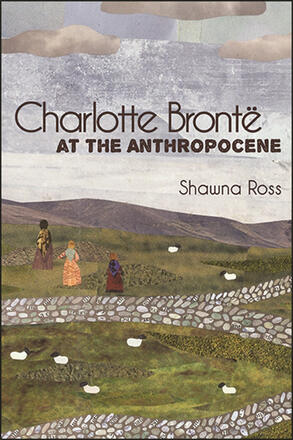
Charlotte Brontë at the Anthropocene
Alternative formats available from:
Forges a fresh interpretation of Charlotte Brontë’s oeuvre as a response to ecological instability.
Description
Honorable Mention, 2020 Sonya Rudikoff Award presented by the Northeast Victorian Studies Association
In this book, Shawna Ross argues that Charlotte Brontë was an attentive witness of the Anthropocene and created one of the first literary ecosystems animated by human-caused environmental change. Brontë combined her personal experiences, scientific knowledge, and narrative skills to document environmental change in her representations of moorlands, valleys, villages, and towns, and the processes that disrupted them, including extinction, deforestation, industrialization, and urbanization. Juxtaposing close readings of Brontë's fiction with Victorian and contemporary science writing, as well as with the writings of Brontë's family members, Ross reveals the importance of storytelling for understanding how human behaviors contribute to environmental instability and why we resist changing our destructive habits. Ultimately, Brontë's lifelong engagement with the nonhuman world offers five powerful strategies for coping with ecological crises: to witness destruction carefully, to write about it unflinchingly, to apply those experiences by questioning and redefining toxic definitions of the human, and to mourn the dead, all without forgetting to tend the living.
Shawna Ross is Assistant Professor of English at Texas A&M University. She is the author and editor of several books, including Humans at Work in the Digital Age: Forms of Digital Textual Labor.
Reviews
"Charlotte Brontë at the Anthropocene is a worthy addition to the growing collection of critical thought on environmental disaster in nineteenth-century studies." — Studies in English Literature
"In Charlotte Brontë at the Anthropocene attentive analyses of form and exquisite close readings abound." — Victorian Studies
"For scholars of Brontë and nineteenth-century literature, the text offers a new way of viewing Brontë's novels and is especially strong at trying to navigate some of the thorny complexities of more problematic texts like Shirley. More broadly, it also serves as an excellent introduction to the concept of the Anthropocene, explains its connection to scholars in the humanities, and creates a clear argument for connecting literary studies (especially those focused in the nineteenth century) to the ways we can understand, grieve, protect and preserve our precious Earth in this new 'age of humans.'" — ISLE: Interdisciplinary Studies in Literature and Environment
"In the tour de force history of the burst and its aftermath that occupies the first chapter of Charlotte Brontë at the Anthropocene, Ross finds in the event all the crucial elements that shape her monograph's argument more generally … Like her equally powerful conclusion, which traces the presence of the humble native flower, the bluebell, through writing and editing by the Brontë family to examine the devastations of human loss, Ross's accomplished interdisciplinarity in this first chapter shows all the strengths of the author's approach to studying the Anthropocene as a literary critic.” — Journal of British Studies
"Ross's book is a demanding read even for advanced scholars, but it is worth the effort … Highly recommended." — CHOICE
"Brontë's protagonists are canaries in the coal mine of the Anthropocene, barometers whose experiences register multiple temporal scales of anthropogenic change, from the murky depths of geological deep time to the prehistoric processes by which humans began to reshape their environments permanently, including their degradation of forested uplands to produce the moors the Brontë family are all known for depicting. This book is a tour-de-force, a deeply theoretical exploration of the Brontës'—especially Charlotte's—fiction in relation to concepts from deep time to ghost forests to the ecology of bogs." — Deborah Denenholz Morse, coeditor of A Companion to the Brontës